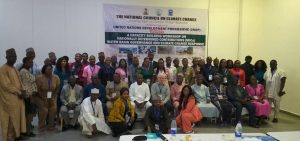The climate change induced risks affecting most of our hydrological systems have tremendous impact on all the hydrological and hydro metrological processes of our activities, energy production and all the rest. It is therefore important that we recognise the value of water as a major component of a sustainable development.

Prof. Emmanuel Oladipo, a climate change specialist, made this submission in his remarks while presenting a paper titled “Water Tracker and Connection to other processes in Nigeria” at a workshop on Basin Adaptation Planning: Building Coordination, held in Lagos from February 13 to 14, 2024.
Prof. Oladipo noted: “The water acts as a sort of connector which addresses the challenges in the sustainable development, connects us with climate change and also connects us with disaster risk reduction.”
While referring to the recent 2023 incident of flooding in Anambra State, the specialist stressed that flooding had become much more intense than before, not only because we are not managing the water resources well but because the stunts that are rising from flash floods are more intense than before.
He mentioned the atmospheric dynamics in the United States of America (USA) which shows the capacity and the ability of warm air due to global warming to absorb so much water that when it pours, it’s like a river coming from the air. He added that these are some of extreme events that makes us to say that we must have the water as a form of commitment that we need.
He said: “The Water Tracker helps in ensuring that water resilience is integrated into national climate plans by illuminating water which is both explicitly and implicitly included in those plans and planning processes.
“In the process of trying to make water as part of the element of implementation of Paris Agreement, the Water Tracker was initiated under the water workstream of the Adaptation Action Coalition with support from the government of the United Kingdom and the Dutch Ministry of Water Resources and Infrastructure.
“The Water Tracker Method is a simple questionnaire designed to draw out how and where water is embedded in climate planning instrument. Countries like Egypt, Malawi, Costa Rica and several others have successfully made use of it which have spurred interest from the Federal Government to see how it can help in our national development plans especially in relation to river basins in Nigeria.”
In his opening remarks, Dr. Salisu Dahiru, the Director-General, National Council on Climate Change (NCCC), who towed Prof. Oladipo’s line, said: “Nigeria like many other countries is experiencing the far-reaching consequences of climate change which are manifesting in various forms including rising temperature, changing rainfall, increased frequency and intensity of extreme weather.”
Represented by Mrs. Chioma Edeh, Dr. Dahiru revealed: “These changes directly affects some of our river basins which affects ecosystems that provide water resources support, biodiversity and also sustain the livelihood of millions of Nigerians.
“Major rivers worldwide have experienced drastic changes in full producing their natural ability to adjust and absorb disturbances.
“Climate scientists predict that the shift will lead to more flooding since more rain will fall than vegetation can absorb.
“Potential consequences of neglecting these issues include but not limited to water scarcity, vulnerability disaster, ecosystem degradation and also conflict of other water resources.”
Mr. Segun Babarinde of Federal Ministry of Water Resources, who noted that economic value of water cannot be quantified, also stressed: “Except you lack the water and the water we are talking about, whether it is small, that is scarcity or it is too much, that is when it is flooding, it is a problem to human existence and as such we need to work hard in ensuring proper management of our nation’s water resources.
“The primary role of the ministry is to ensure adequate supply of potable water in a sustainable manner to the populace without compromising the economic value of the environment because water resources management without proper management and sustainability of the development as it relates to conservation of the environment is not really proper.
“However, the challenges we have is that we are having this issue of climate change coming in and as such we need to marry our sustainable value, our economic value and all other attributes of national development such that human existence could be sustainably managed,” he stated.
Dr. Samuel Adewoyin while speaking on “Future Engagement Activities of The Basin Development Authorities”, described Basin Adaptation Planning as the management and governance of water and water bodies such as rivers, lakes, wetlands and aquiver to ensure sustainable development.
He highlighted the need for Basin Adaptation Planning to include responding to climate change, direct input into production in areas such as agriculture, energy, and industry, among others.
Dr. Adejuwon also raised concerns on the rate at which water resources respond to climate change, even as he listed global warming, population pressure due to urban growth, water pollution, lack of data, poor management and policy implementation as some of the factors.
He said: “As River Basin Authorities, we are looking forward to embarking on increased awareness on climate change as it impacts on the basin development, comprehensive survey of the basin detailing rivers, soil characteristics and vegetation cover, development on policy instrument on river basins.
“Others are enforcement of the rules and regulations governing the use of river basins, implementation of policy developed, budget provision for policy implementation among others.
The capacity building workshop on Nationally Determined Contributions (NDCs) Water Basin Governance and Climate Change Response was organised by the National Council on Climate Change (NCCC) with support from the United Nations Development Programme (UNDP).
It was graced by delegates such as David Hebart-Coleman, Senior Programme Manager, Stockholm International Water Institute (SIWI); Dr. Eugene Itua, Director Natural Eco-Capital; Kolawole Banwo, Head of Advocacy, Policy and Communications at WaterAid Nigeria; and several other participants from relevant Ministries Department and Agencies across the six geo-political zones of Nigeria.
By Ajibola Adedoye
